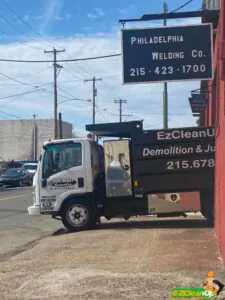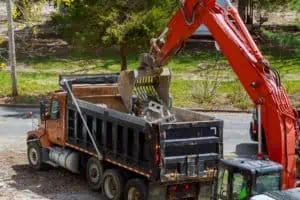To dispose of plywood, find local recycling centers for recyclable types or use curbside pickup for non-recyclable plywood. Consider donating usable plywood to community projects. Ensure to prepare plywood by removing contaminants and sorting by type.
If you want to know more about the other ways on how to dispose of plywood, read our guide.
Recycling and Upcycling Options in the Disposal of Plywood
Plywood is a versatile and sustainable material widely used in various construction and DIY projects. Its disposal, however, requires thoughtful consideration to minimize environmental impact and promote recycling and reuse.
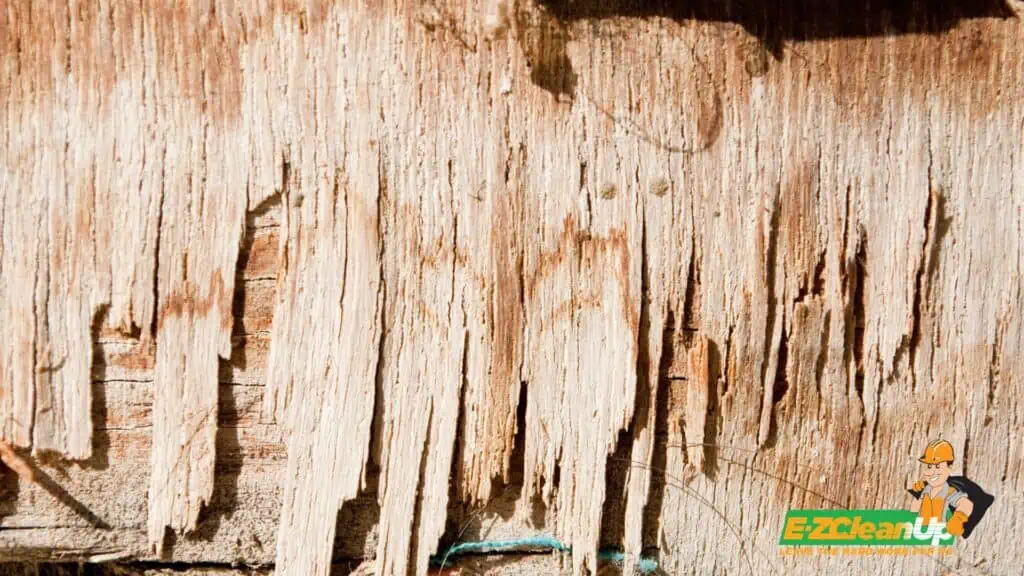
The Plywood Recycling Process
Recycling centers specializing in wood or construction debris often accept plywood. It’s essential to research local recycling centers and contact them to understand their guidelines, what types of plywood they accept, and if they offer any pickup services for large quantities.
Challenges in Recycling Plywood
Recycling plywood presents a unique set of challenges due to its composite nature. This includes multiple layers of wood bonded with adhesives and often coated with paint, stains, or varnishes.
It specifically presents the following challenges:
- Contamination: Plywood often contains glues, varnishes, paints, and sometimes heavy metals. Differences in contamination levels require detailed characterization of wood waste according to its source, type, and quality grade.
- Recycling Process Difficulties: The physical and chemical impurities in plywood affect the quality of the recycled wood. Efficient recycling demands separate collection, sorting, and handling to enhance the resource quality of wood waste.
- Structural and Market Limitations: Recycled plywood may lack the strength and durability of new wood. Moreover, the market for recycled wood is subject to price fluctuations due to limited supply.
Creative Reuse of Old Plywood
Plywood’s durability and aesthetic appeal make it ideal for various DIY projects, including the following:
- Keyholder: Utilize strips of birch plywood to create a dimensional keyholder that showcases chevron patterns for added visual interest.
- Wall Art: Craft three-dimensional wall decor by layering thin scrap plywood cut into various shapes.
- Sunburst Mirror: Transform plywood scraps into a stunning sunburst mirror, using triangles and diamonds for a beachy vibe.
- Terrarium Holders: Craft modern plant stands for globe terrariums using 1/4-inch plywood scraps.
- Coasters: Personalize your coasters using scrap plywood and watercolor paints.
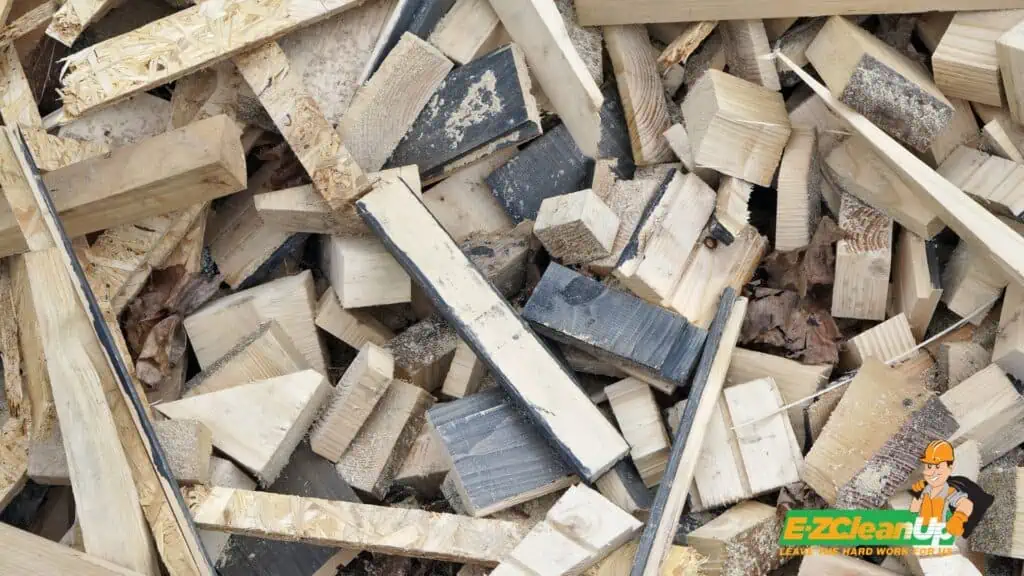
- Kitchen Drawer Dividers: Organize your kitchen drawers with simple plywood dividers, where you can keep utensils and tools neatly arranged.
- Rolling Plant Stand: A rolling plywood plant stand is ideal for displaying your plant collection. This makes it easy to move plants for sunlight exposure.
- Modern Bedside Table: Incorporate current trends like arches into your furniture by crafting a plywood bedside table.
- Built-in Dresser for Walk-In Closets: Tackle a larger project by creating a built-in plywood dresser with cubbies.
- DIY Mudroom Lockers: Add functional storage to your home entrance with mudroom lockers made from plywood.
Community Projects and Donations
Donating unused plywood to community projects and non-profit organizations significantly benefits both environmental sustainability and local community development. Here are examples of how such donations have supported valuable community work:
Talent Maker City in Talent, Oregon
Timber Products has been donating plywood materials annually to Talent Maker City, a non-profit organization focused on STEAM-based learning and hands-on creative experiences. This initiative aims to build a more connected, diverse community by offering workshops for both youth and adults in various crafts, including woodworking, using donated materials.
These workshops serve educational purposes and provide essential skills. They also support cross-generational and cross-cultural learning.
Habitat for Humanity ReStores
These ReStores accept a wide variety of new and used building materials, including plywood. The proceeds from the sale of these materials help fund Habitat for Humanity’s efforts to build and repair homes for families in need.
By donating to Habitat ReStores, individuals and companies can ensure that their unused materials avoid landfills and instead contribute to the construction of affordable housing.
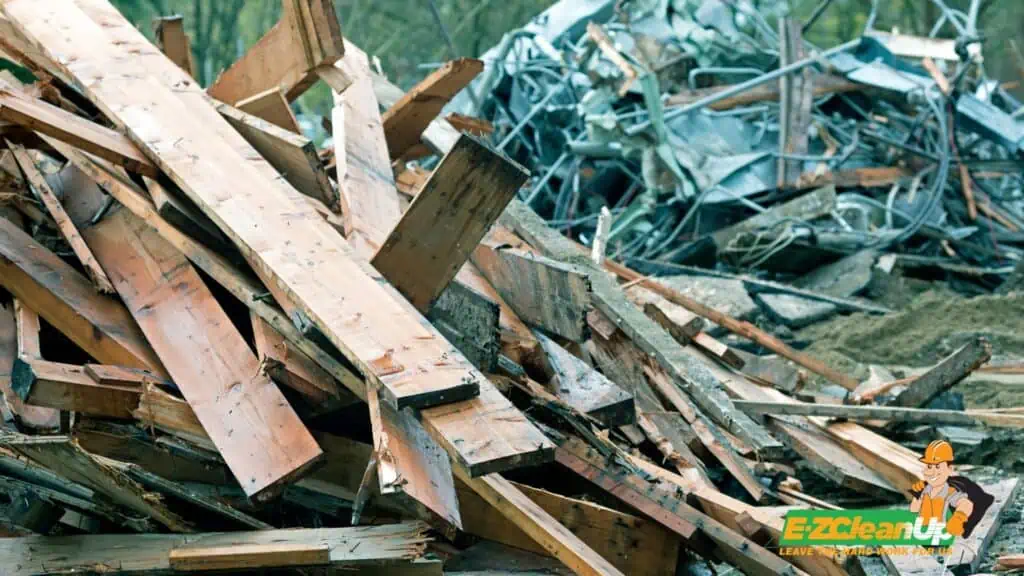
Disposal Methods for Non-Recyclable Plywood
When it comes to non-recyclable plywood, responsible disposal methods are essential to ensure environmental sustainability and compliance with local regulations.
Using Designated Waste Collection Services
For non-recyclable plywood, municipalities often provide curbside pickup services aimed at yard waste, including untreated lumber and plywood scraps. These services necessitate adherence to local waste management guidelines.
They require residents to follow specific schedules and preparation instructions for waste pickup. This ensures the environmentally responsible disposal of plywood, which aligns with community waste management practices and regulations.
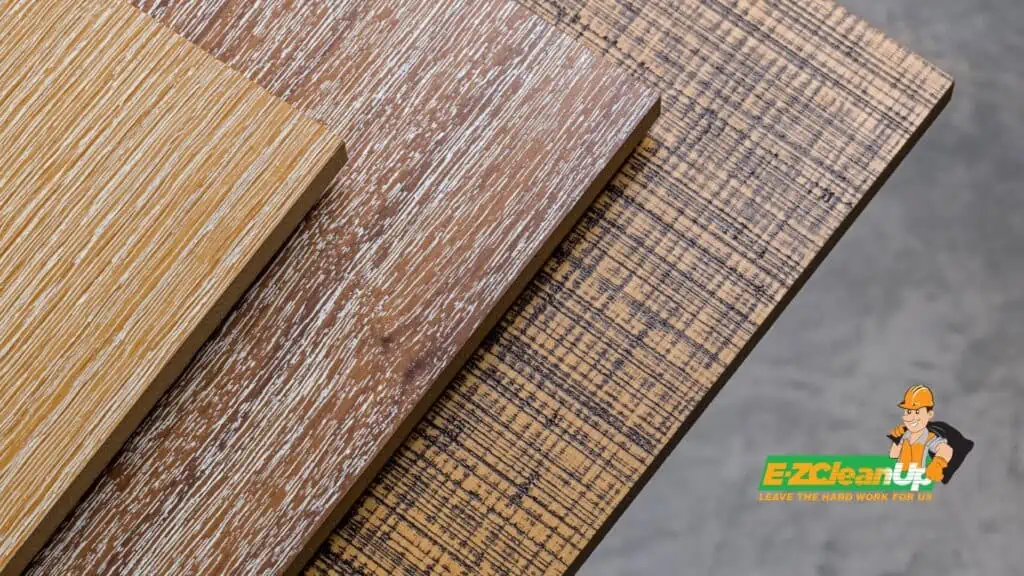
Commercial Disposal Services for Larger Quantities
For businesses or projects that generate larger quantities of non-recyclable plywood, commercial disposal services provide a viable option. These services are equipped to handle bulk waste materials, offering an efficient way to dispose of plywood responsibly.
Landfill Considerations and Restrictions
When disposing of non-recyclable plywood in landfills, it’s essential to adhere to local regulations and be aware of landfill restrictions. Many areas have specific guidelines for disposing of materials like plywood to reduce environmental harm.
Some landfills might have special areas or procedures for construction debris to ensure it doesn’t contaminate the environment. Always check with your local waste management authorities to understand the correct disposal methods for plywood in your area.
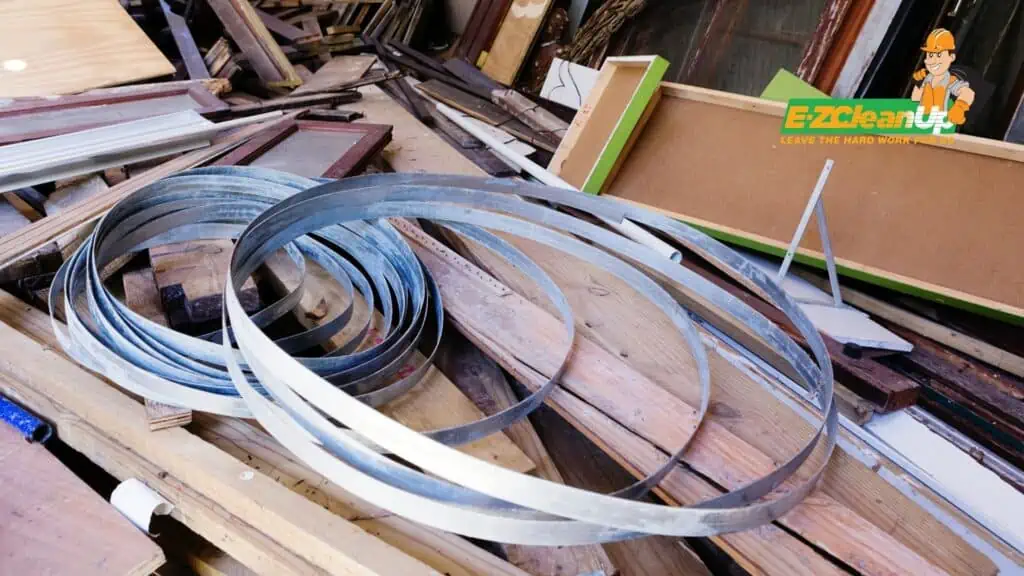
Special Waste Disposal Events
Communities often organize special waste disposal events for hazardous or difficult-to-recycle materials. These events provide an opportunity to safely dispose of non-recyclable plywood and other similar waste, ensuring it’s handled in an environmentally responsible manner.
Preparing Plywood for Disposal or Recycling
Before disposing of or recycling plywood, it’s crucial to prepare it appropriately to ensure environmental safety and efficiency in processing. Here’s a streamlined guide to get you started:
1. Separating Plywood by Type and Condition
Begin by categorizing the plywood into two main types based on its recyclability. This differentiation is crucial for ensuring that only safe and acceptable materials are sent for recycling.
Identifying Recyclable Plywood (Class A)
Look for untreated plywood or types treated without hazardous chemicals, such as chromated copper arsenate (CCA). To determine if the plywood is recyclable, inspect it for visible signs of chemical treatments. If you are uncertain about the type of treatment or its safety, consult local environmental authorities or waste management experts for guidance.
Recognizing Non-recyclable Plywood (Class B)
This category includes plywood treated with chemicals that pose environmental or health hazards, like those containing heavy metals such as arsenic. Identification can be made by looking for stamps, labels, or any documentation that indicates the use of such treatments. Plywood without clear markings may require further investigation or professional advice to determine its class.
2. Cleaning and Removing Contaminants
Use tools such as hammers and pliers to carefully remove nails, screws, and other metal fasteners. This step ensures that the plywood is free from elements that can damage recycling machinery or harm workers.
If the plywood has been painted or has adhesive residues, employ a putty knife to scrape off these substances. For tougher adhesives or paints, a solvent-based paint stripper can be effective. Always follow safety guidelines when using chemical strippers, including wearing protective gear.
After removing contaminants, sand the plywood to smooth out the surface. This final cleaning step ensures that the plywood is in the best possible condition for recycling, free from substances that could interfere with the process.
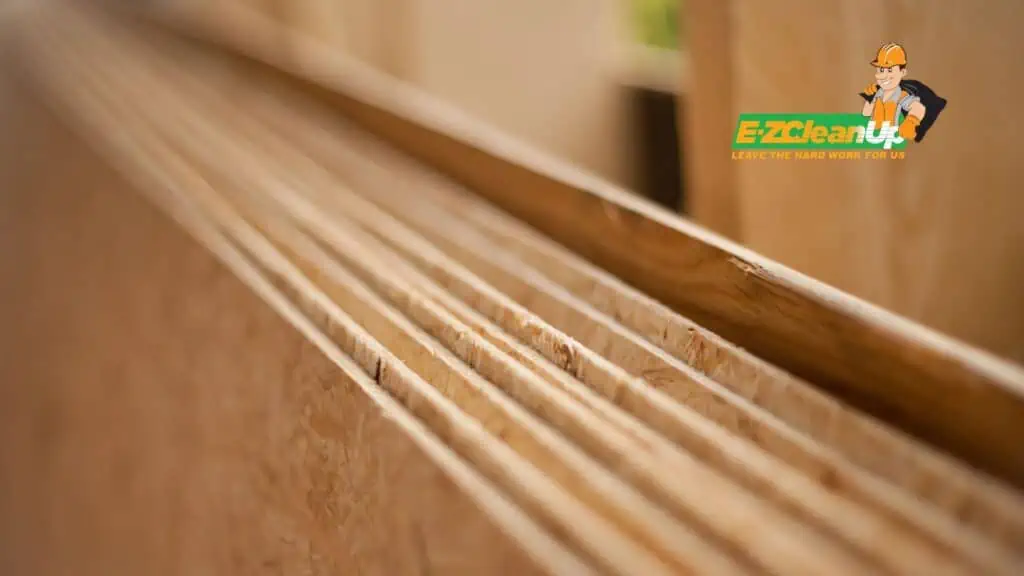
3. Finding a Suitable Recycling Center
Conduct research to find local recycling centers or services that process plywood. Utilize online resources, local directories, or contact your municipal waste management department for recommendations.
Pay close attention to the guidelines and requirements of each recycling center. Some centers may have specific criteria for the types of plywood they accept, based on the treatment and condition of the wood.
If you have a large quantity of plywood, inquire about pickup services. Some centers offer this convenience for significant volumes, which can save you time and effort in transporting the plywood.
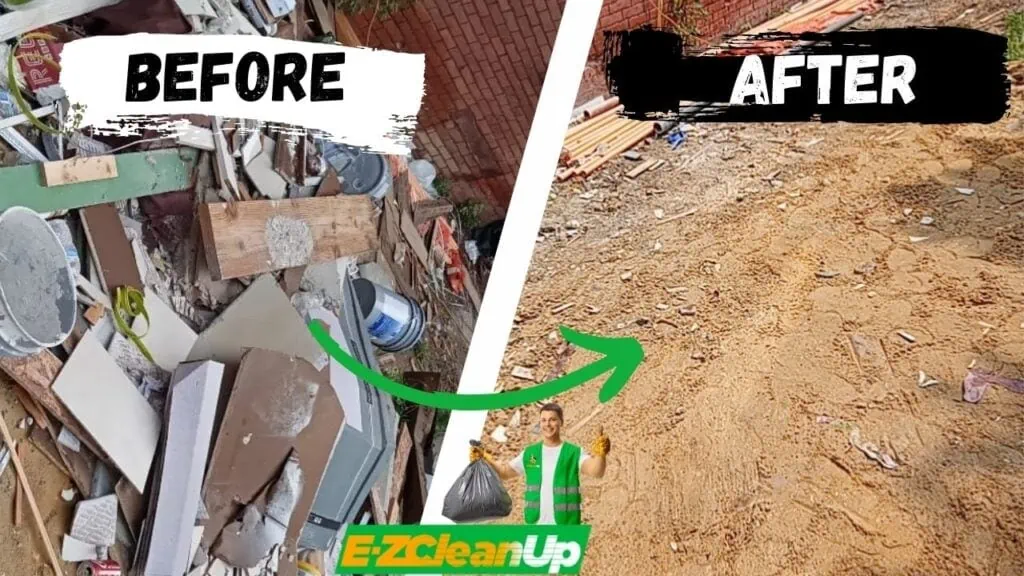
Plywood Disposal Made EZ
The complexity of recycling plywood, due to its composite nature and potential contamination, highlights the importance of choosing the right disposal or recycling path. We at EZ CleanUp are always ready to assist you in dealing with these challenges.
Whether it’s hauling away non-contaminated plywood from your construction site or guiding you towards responsible recycling and donation options, our services ensure that your disposal practices contribute positively to environmental sustainability.
Let’s make responsible plywood disposal a priority in our communities. Reach out to us, and we’ll be there.


